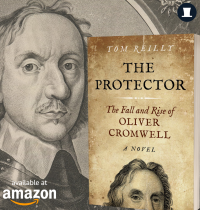
The definitive research that proves the Irish nation owes Oliver Cromwell a huge posthumous apology for wrongly convicting him of civilian atrocities in 1649.
The publication of Tom Reilly’s book "Cromwell: An Honourable Enemy" fifteen years ago sparked off a storm of controversy. Many historians publicly derided the divisive and ground-breaking study. Dissatisfied with the counter-explanations of these experts on Cromwell’s complicity in war crimes in Ireland, amateur historian Tom Reilly again throws down the gauntlet to professional historians everywhere. His second book Cromwell was Framed contains original and radical insights.
Breaking the mould of the genre, for the first time ever, Reilly publishes the contemporary documents (usually the preserve of historians) so that the authentic primary source documents can be interpreted by the general reader, without prejudice. Among the author’s fresh discoveries is the revelation of the identity of two unscrupulous individuals who created the myth that Cromwell deliberately killed unarmed men, women and children at both Drogheda and Wexford, and that a 1649 London newspaper reported that Cromwell’s penis had been shot off at Drogheda.
Whatever your view on Cromwell, this book is persuasive. Conventional wisdom is challenged. Lingering myths are finally dispelled.
The author is to be commended for highlighting a subject that academic historians neglect but piques public interest: the publisher of Cromwell Was Framed asserts on its website that “the Irish nation owes Oliver Cromwell a huge posthumous apology for wrongly convicting him of civilian atrocities.- Amazon Review
Tom Reilly
Amateur historian Tom Reilly has almost single-handedly taken on the might of academia with regard to Cromwell and allegations of his complicity in civilian atrocity stories in Ireland. Change that, and you change so much about our understanding of Cromwell.
He has appeared on national TV and radio in both the UK and Ireland in both documentaries and chat shows. His previous book on Cromwell has been reviewed by all of the national newspapers in Ireland and many in the UK including one on the front cover of the book supplement of the Sunday Times. He lives in County Louth, Ireland.
Tom Reilly discusses Oliver Cromwell's role in Ireland with a fresh and different perspective. His take on Cromwell, although very different from that of many historians, argues that Cromwell, despite contemporary claims, played a less violent role in the Ireland campaign and many atrocities attributed to him (specifically in Drogheda and Wexford in 1649). Reilly's language is engaging and entertaining and his argument has merit, it got my attention and raised questions regarding modern concepts of Cromwell in Ireland - Amazon Review
Categories:
0 comments on this article












